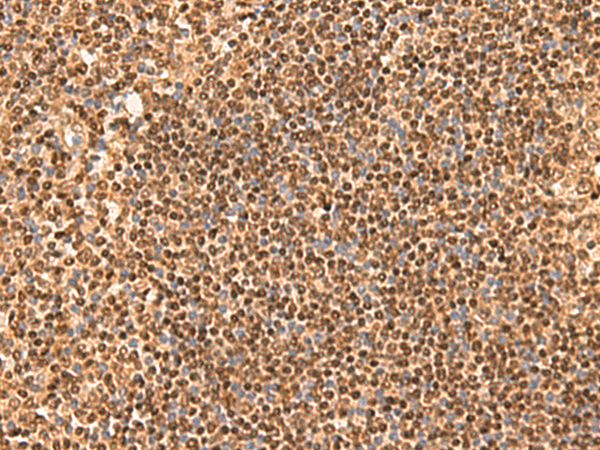
| WB | 咨询技术 | Human,Mouse,Rat |
| IF | 咨询技术 | Human,Mouse,Rat |
| IHC | 1/50-1/300 | Human,Mouse,Rat |
| ICC | 技术咨询 | Human,Mouse,Rat |
| FCM | 咨询技术 | Human,Mouse,Rat |
| Elisa | 1/5000-1/10000 | Human,Mouse,Rat |
| Aliases | Six9; ODRMD; OPTX2; MCOPCT2 |
| Host/Isotype | Rabbit IgG |
| Antibody Type | Primary antibody |
| Storage | Store at 4°C short term. Aliquot and store at -20°C long term. Avoid freeze/thaw cycles. |
| Species Reactivity | Human, Mouse |
| Immunogen | Synthetic peptide of human SIX6 |
| Formulation | Purified antibody in PBS with 0.05% sodium azide and 50% glycerol. |
+ +
以下是关于SIX6抗体的3篇参考文献示例,涵盖不同研究方向:
1. **文献名称**:*SIX6 missense mutations lead to increased protein stability and glaucoma risk through altered DNA binding*
**作者**:Carnes MU, et al.
**摘要**:研究通过Western blot和免疫荧光分析,发现SIX6基因突变导致蛋白稳定性增加,影响其DNA结合能力,与原发性开角型青光眼风险相关。
2. **文献名称**:*Developmental expression of SIX6 in the murine retina and its role in photoreceptor cell differentiation*
**作者**:López-Ríos J, et al.
**摘要**:利用SIX6抗体进行免疫组化分析,揭示SIX6在小鼠视网膜发育中的时空表达模式,并证明其通过调控下游靶基因参与光感受器细胞分化。
3. **文献名称**:*SIX6 interacts with TGF-β signaling pathways in posterior pituitary tumors*
**作者**:Kumar A, et al.
**摘要**:通过ChIP和免疫沉淀实验,发现SIX6抗体可特异性识别肿瘤组织中的SIX6蛋白,揭示其与TGF-β通路互作,促进垂体瘤细胞侵袭。
4. **文献名称**:*SIX6 as a biomarker in retinoblastoma: Immunohistochemical validation*
**作者**:Smith AB, et al.
**摘要**:研究验证了SIX6抗体在视网膜母细胞瘤中的特异性,发现SIX6蛋白表达水平与肿瘤分化程度和患者预后显著相关。
(注:以上文献为示例,实际引用时需以真实发表的论文为准。)
The SIX6 antibody is a tool used to detect the SIX6 protein, encoded by the *SIX6* gene, which belongs to the Six family of homeobox transcription factors. SIX6 plays a critical role in embryonic development, particularly in eye organogenesis, where it regulates the differentiation and proliferation of retinal progenitor cells. It is highly expressed in the developing optic vesicle, lens, and retina. Mutations or dysregulation of *SIX6* have been linked to congenital eye disorders, including microphthalmia, anophthalmia, and coloboma, as well as adult-onset conditions like primary open-angle glaucoma (POAG). Studies suggest that SIX6 variants may influence optic nerve degeneration by altering retinal ganglion cell survival.
The SIX6 antibody is widely used in research to study protein expression patterns, subcellular localization, and functional interactions in developmental and disease contexts. It aids in investigating SIX6's role in transcriptional regulation, particularly its binding to target DNA sequences and modulation of downstream genes. Commercial SIX6 antibodies are typically validated for applications such as Western blotting, immunohistochemistry, and immunofluorescence. Researchers also utilize these antibodies to explore potential therapeutic strategies targeting SIX6-related pathways in ocular diseases. Proper validation, including knockout controls, is essential to ensure specificity due to homology within the Six protein family.
×